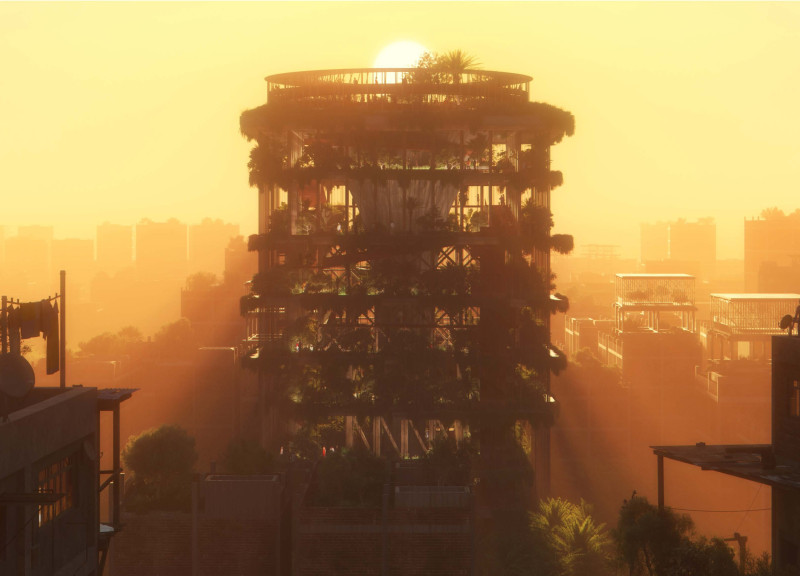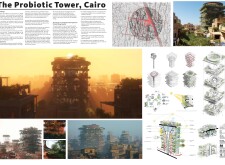5 key facts about this project
## Project Overview
Located in Cairo, Egypt, the Probiotic Tower is an architectural endeavor that addresses the urban challenges of environmental degradation, climate change, and social inequality. This project exemplifies a strategic response to the pressing issues faced by the region, aiming to serve as a prototype for future urban developments throughout the Middle East and North Africa.
## Conceptual Framework
The Probiotic Tower embraces the concept of a "Therapeutic Urban System," with a focus on sustainability, community engagement, and resilience. The design emphasizes the integration of natural elements within the built environment, fostering biodiversity and supporting a livable urban ecosystem. By encouraging social interactions and promoting ecological conservation, the tower is designed to adapt to the rapidly changing urban landscape.
### Modular Design and Biodiversity Promotion
A key aspect of the Probiotic Tower is its modular building system, which incorporates urban agriculture principles to optimize space while enhancing the structure's ecological footprint. The use of living green walls and rooftop gardens further underscores the project’s commitment to biodiversity. These biophilic design elements aim to provide habitats for various species, improve air quality, and mitigate the urban heat effect.
### Adaptability and Materiality
The tower's adaptable design allows for modifications based on the evolving needs of the community, ensuring its continued relevance. The selection of materials reflects a focus on sustainability and ecological responsibility. Reinforced concrete provides structural integrity, while a steel framework allows for design flexibility. Extensive use of glass enhances natural light penetration, thereby reducing energy consumption, while integrated greenery contributes to thermal insulation and aesthetics.
### Design Elements
The architectural language of the Probiotic Tower is defined by several distinctive features:
- **Vertical Gardens**: These elements not only facilitate local food production but also enhance biodiversity, ensuring a sustainable resource for residents.
- **Flexible Community Spaces**: Designed to foster social interaction, these areas can be adapted for various community activities, promoting a sense of belonging among residents.
- **Sustainable Energy Solutions**: The incorporation of renewable energy sources, such as solar panels, enhances energy efficiency and minimizes reliance on non-renewable resources.
- **Innovative Water Management Systems**: Strategies for rainwater harvesting and greywater recycling are implemented to ensure efficient water use, addressing regional water scarcity concerns.
Through its comprehensive approach to urban living, the Probiotic Tower represents a synthesis of sustainability, community engagement, and innovative design within the architectural landscape of Cairo. The project is characterized by its focus on ecological resilience to climate challenges, including strategies for heatwaves and flooding, and a community-centric approach that encourages resident participation in building maintenance and outdoor cultivation.




















































